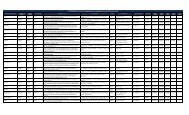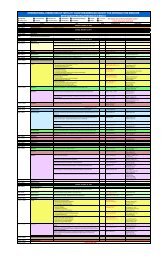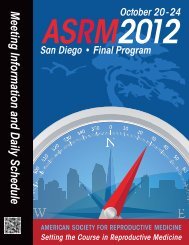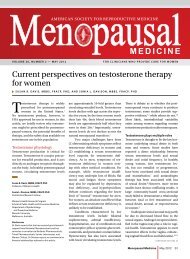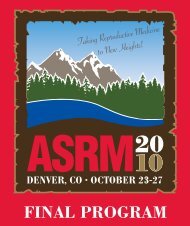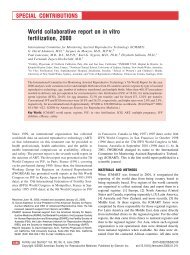scientific program • symposia - American Society for Reproductive ...
scientific program • symposia - American Society for Reproductive ...
scientific program • symposia - American Society for Reproductive ...
Create successful ePaper yourself
Turn your PDF publications into a flip-book with our unique Google optimized e-Paper software.
SCIENTIFIC PROGRAM <strong>•</strong> INTERACTIVE SESSIONS<br />
Wednesday, October 19, 2011 1:15 pm – 2:15 pm<br />
Interactive Session<br />
SCIENTIFIC OPPORTUNITIES IN GENERATING GAMETES FROM<br />
INFERTILITY PATIENTS’ STEM CELLS<br />
Presented by the Regenerative Medicine and Stem Cell Special Interest<br />
Group<br />
Gerald P. Schatten, Ph.D. (Chair)<br />
University of Pittsburgh School of Medicine<br />
Gianpiero D. Palermo, M.D., Ph.D.<br />
Cornell University<br />
Needs Assessment and Description<br />
Significant progress has been made in making gametes of<br />
varying quality in model murine systems from pluripotent<br />
stem cells in vitro. These strategies hold promise <strong>for</strong> designing<br />
novel contraceptives, treating infertility and restoring<br />
fertility in children who survive cancer. While most of<br />
these breakthroughs are highly promising from research<br />
perspectives and typically are successful using inbred<br />
strains of certain murine models, the gap between the<br />
announcement of a breakthrough in the lay publications<br />
and the actual successful translation to the clinical setting<br />
as a responsible and reliable therapy can take decades.<br />
Consequently, there are ongoing and urgent needs <strong>for</strong> the<br />
ASRM community to in<strong>for</strong>m colleagues about the <strong>scientific</strong><br />
status of stem cells and regenerative medicine, and to keep<br />
them updated on the progress of the long process <strong>for</strong> safely<br />
translating them to the ART <strong>for</strong> routine clinical practice.<br />
MALE-TO-FEMALE TRANSGENDER SURGERY: TECHNIQUES,<br />
RESULTS AND POSTOPERATIVE SEXUALITY<br />
Joint Session presented by the <strong>Society</strong> of <strong>Reproductive</strong> Surgeons and the<br />
Sexuality Special Interest Group<br />
Stanton C. Honig, M.D. (Chair)<br />
University of Connecticut School of Medicine<br />
Jared C. Robins, M.D.<br />
The Warren Alpert Medical School of Brown University<br />
Christine McGinn, M.D.<br />
Papillion Center, New Hope, Pennsylvania<br />
Needs Assessment and Description<br />
The reproductive endocrinologist, urologist, mental health<br />
professional, nurse or other health care provider may be<br />
faced with the evaluation and treatment of the transgender<br />
patient. The evaluation of the transgender patient <strong>for</strong><br />
surgery is complex and generally requires that the patient<br />
meet the World Professional Association <strong>for</strong> Transgender<br />
Health (WPATH) Standards of Care <strong>for</strong> Gender Identity<br />
Disorders <strong>for</strong> consideration <strong>for</strong> surgery. This includes real<br />
life experience <strong>for</strong> 1 year, 1 year of hormone replacement<br />
therapy and documentation of stable mental health by two<br />
health care professionals.<br />
The surgical approach <strong>for</strong> male-to-female treatment<br />
is complex and usually requires orchiectomy, partial<br />
penectomy and creation of a neoclitoris, neourethra,<br />
neovagina (different methods will be discussed) and<br />
creation of an external genital introitus, usually with scrotal<br />
skin. Postoperative care will be discussed as well as the<br />
importance of the creation of reasonable postoperative<br />
expectations of sexuality.<br />
Room 224 C/D<br />
94<br />
Learning Objectives<br />
At the conclusion of this session, participants should be able<br />
to:<br />
1. Identify evidence-based developments <strong>for</strong> the use of<br />
stem cells in the treatment of disorders related to infertility.<br />
2. Critically appraise the state of the <strong>scientific</strong> knowledge<br />
and the steps necessary to translate this in<strong>for</strong>mation<br />
regarding the generation of sperm from pluripotent stem<br />
cells to the ART clinic.<br />
ACGME COMPETENCY<br />
Medical Knowledge<br />
TEST QUESTION:<br />
A male infertility patient has been successfully treated by<br />
the transfer of spermatogenic stem cells into his previously<br />
aspermic testes. Which one of the following statements is<br />
true, given the state of the field in 2011?<br />
A. The patient is a childhood survivor of cancer, which<br />
rendered him infertile, but the thawing of his previously<br />
frozen spermatogenic cells transferred after puberty,<br />
restored his fertility.<br />
B. The patient is a mouse.<br />
C. The patient is a man who suffered previously from<br />
idiopathic male infertility.<br />
D. The patient is a man with Sertoli cell only syndrome.<br />
Wednesday, October 19, 2011 1:15 pm – 2:15 pm<br />
Interactive Session<br />
Room 222<br />
Learning Objectives<br />
At the conclusion of this session, participants should be able<br />
to:<br />
1. Apply the WPATH Standards of Care <strong>for</strong> Gender Identity<br />
Disorders.<br />
2. List the surgical options <strong>for</strong> male-to-female transsexual<br />
surgery.<br />
3. Describe the potential complications of transsexual<br />
surgery.<br />
4. Review the surgical techniques to optimize postoperative<br />
sexuality <strong>for</strong> the transsexual patient.<br />
ACGME COMPETENCY<br />
Medical Knowledge<br />
Patient Care<br />
TEST QUESTION:<br />
After participating in this session, <strong>for</strong> patients considering<br />
transsexual surgery I will do the following in my practice:<br />
A. Use the WPATH criteria including evaluation by mental<br />
health professionals.<br />
B. Recommend continuing all estrogen treatment prior to<br />
surgery.<br />
C. Do not recommend regular vaginal dilation as part of<br />
postoperative care.<br />
D. Per<strong>for</strong>m cystoscopy preoperatively and postoperatively<br />
to assess voiding and urinary function.<br />
E. Not applicable to my area of practice.



